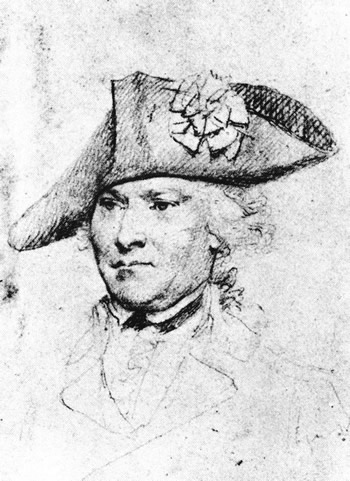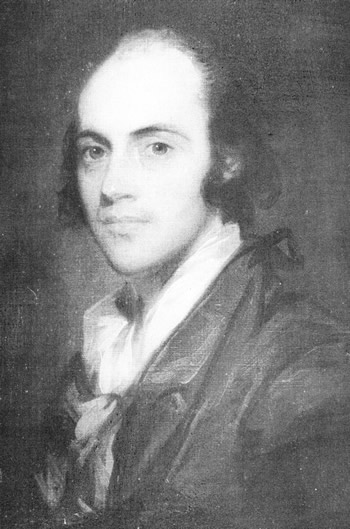Corridor Through the Mountains
Smith's Clove: Wartime Line of Communication and Passageway for the Continental Army, 1776-1783
Richard J. Koke
[Editor's Note: Richard J. Koke authored a series of five articles that appeared in Volumes 19 -23 of the OCHS Journal between 1990 and 1994. These articles will be presented in multiple sections over the next few years.]
Part IV:
1779: A Crucial Year
Chapter 2:
Aaron Burr's Ride
The American Highland command under Major-General Alexander McDougall was on the defensive, certain after the loss of the ferry that an attack on West Point was imminent both by land and water. There were those in the mountains who remembered only too well the Highland disaster of 1777 and the unpredictable adroitness of the wily Clinton when on the offensive. Unaware that the probing reconnaissance and movement of ships on June 3 was subterfuge, McDougall could only speculate as to enemy intent and apprehensively waited attack.
The first three days of the month were tense at Highland headquarters east of the river. McDougall and his officers not only expected the ships to move upstream against the Point, but that enemy flanking columns could be expected to move into the mountains on both sides of the Hudson to within striking distance of the Point - on the east, by way of the Continental Village and the Gorge of the Mountains to the river shore at Nelson's Point, where contact could be made with the ships; and on the west, by landing troops at the abandoned ruins of Fort Montgomery and marching inland to the Forest of Dean from where, by a rough road (now Route 293) leading through the upland country between Smith's Clove and the river, the enemy could encircle and invest West Point from the rear.
Added to this, was a possibility that the British could also threaten Smith's Clove with the assistance of inhabitants "debauched" to their cause, who could guide them through the "hideous mountains" west of the Forest and into the Clove to sever the highway and "give much annoyance" to troops and supply trains using the road. The apprehensions of three years that a penetration of the Clove could come only from New Jersey through the narrow southern entrance at Suffern's was suddenly dispelled with a realization that, with an enemy in the mountains, the Clove was also vulnerable and open to attack from the east by the crossroads that joined the Clove highway at the home of the Widow Van Ambrose and the taverns of Earl and June. The danger of encirclement was to color military thinking for days to come.
With King's Ferry lost, McDougall's most direct line of communication with Washington from east of the Hudson was gone and the only remaining route into New Jersey was by way of New Windsor and through Smith's Clove. The fear of an investiture of West Point and the need to block such a move made it imperative that he contact Major-General Arthur St. Clair (pronounced sin-clair) who was on his march to Pompton with the advance division of Washington's army, to urge that he push through the Clove to New Windsor and take position in the area of Butter Hill (now Storm King) to cover the Point and prevent an attack "from the upper side."
 MAJOR GENERAL ARTHUR ST. CLAIR (1736-1818), commanding officer of the Pennsylvania division, 1779. Pencil sketch, 1790, by John Trumbull (17561843). Courtesy of the Metropolitan Museum of Art, New York City.
MAJOR GENERAL ARTHUR ST. CLAIR (1736-1818), commanding officer of the Pennsylvania division, 1779. Pencil sketch, 1790, by John Trumbull (17561843). Courtesy of the Metropolitan Museum of Art, New York City.
The danger of travel in the Clove and possible interception fixed McDougall into a determination that the message had to be verbal and charged to a trustworthy courier. Among those with him at headquarters in the isolated Budd house on the post road was Aaron Burr, civilian, late lieutenant-colonel in the army but retired and visiting with the general. McDougall asked if he would serve as messenger.
 AARON BURR (1756-1836), Lieutenant-Colonel of Malcom's Additional Continental Regiment, 1777-79. Portrait painted c. 1792 by Gilbert Stuart (17551828). Courtesy of the New Jersey Historical Society.
AARON BURR (1756-1836), Lieutenant-Colonel of Malcom's Additional Continental Regiment, 1777-79. Portrait painted c. 1792 by Gilbert Stuart (17551828). Courtesy of the New Jersey Historical Society.
Pompton was close to sixty miles distant, allowing for the detour, but Burr, acquiescing, knew the country intimately and had the brash confidence of a twenty-three-year-old. To facilitate his journey, McDougall prepared two orders in writing on June 2 directed "to whom it may concern", that Colonel Burr, "being on urgent business, is to put across the ferry at New Windsor without delay", and that Colonel Burr, "being on very pressing business, every magistrate will assist him in changing horses and all friends of the country will also assist him".
Charged verbally, Burr galloped to Fishkill and down to the landing and was taken across to New Windsor, and as day lengthened and darkness descended on the mountains of the Orange corridor he made his way down the twenty-three mile length of the Clove Road to Suffern's tavern - luckily, without incident - and then another ten to Pompton, and around 3:00 in the morning entered the silent encampment of the sleeping Pennsylvania division and was taken to St. Clair's quarters.
Part I
Introduction
Clove and Precinct
The Clove Road
The Clove Taverns
Clove Taverns II
Part II
Prelude to War
The Continentals Arrive
Blocking the Clove
In the Midst of Tories
Offensive from the Highlands
The Militia Take Over
The Post at Ramapo
The Reluctant Militia
Holding the Line
An Embarrassing Situation
To Galloway's and Back
The Scotsman's Regiment
September Raid
Prelude for Disaster
Clinton Takes the Highlands
Sidman's Bridge: The Last Holdout
Part III
Introduction
Summer, 1778
A Cogent Appraisal
Villains and Robbers
Part IV
Introduction
Aaron Burr's Ride
March to the Clove
The Barren Clove
Bracing for Attack
Among the Rocks and Rattlesnakes
The Present Interesting Occasion
A Waiting Game
Redeployment
The Continental Road
The Taphouse Keeper's Daughter
The Indian Fighters Appear
March to Morristown
Part V
Introduction
A Fruitless Excursion
Summer at the Clove
A Frenchman's Journey
Pompton Mutiny: Blood in the Snow
Blockhouse in the Clove
The Allies at New Antrim
The Intercepted Messenger
A Questionable Story
What Really Happened
Perils of A Post Rider
New Yorkers at the Clove
Congress' Own Regiment
The Last Garrison
A Man of Passion
Homeless Canadians
The Last March
Part VI
Introduction
The Post at Sidman's Bridge
Marking the Site

